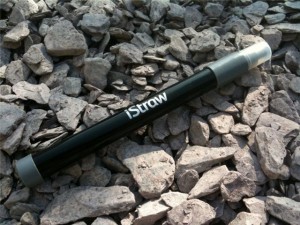You are in a fading hotel in a forlorn town in a country far away. It’s the middle of the night, and you’re very thirsty. But this is not the sort of place that offers tea-making equipment, still less room service.
So you turn on the bathroom tap. There is a ready gush, but you would never risk that water. You might tolerate the metallic tang, but it’s the possible teeming, unseen biological menace within that’s the issue. What a good thing, then, that you packed your personal water purification system, no bigger than a fat cigar.
Until recently ensuring that any water that did not come from a sealed plastic bottle was safe to drink in such circumstances would have required equipping yourself with a small stove to boil it, iodine tablets to be sure, even a clean cloth to sieve out any sediment. And then you would have to drink the resulting brew rapidly, while holding your nose.
The pocket sized iStraw, developed by Australian Razmik Dutek rather than Steve Jobs’s electronics empire, offers the wary traveller a convenient alternative to that paraphernalia. You pour yourself a glass, insert the sturdy plastic tube, suck and slake your thirst. The risk level you couldn’t quantify turns into a 99.99% certainty (according to tests by an Australian government-approved laboratory) that all known bacteria and dangerous microorganisms have been filtered out.
iStraw’s British distributors KC Enterprise, who launched it this summer, say their product is appropriate for those occasions and places where you simply don’t trust the drinking water. Which means a lot of the known world, including, it would seem, the House of Commons, where 16,200 litres of bottled water were supplied to Committee Rooms last year.
The cost, £20, may seem high for an airport impulse buy, but KC’s spokesman Darren Khan said iStraw should last about a year (it comes with sterilising tablets) or for about 500 litres of drinking water, the equivalent of 1300 bottles. Khan sees a wide potential market among tourists, traveling business people and parents provisioning their globe-wandering gap year offspring.
I have used it in Spain, Turkey and North Africa on hotel tap water. The water was good to drink, with no aftertaste. Of course, there may have been nothing the matter with it in the first place. But I didn’t put myself to the bother of finding out, and spared the planet the carbon footprint from half a dozen plastic bottles.
I also had the convenience of drinking from a source I have avoided since I first ventured abroad as a schoolboy, with that stern injunction ringing in my ears: “Don’t drink the tap water.”
iStraw, about 9 inches long, and the width of a medium-sized it cigar, is the result of three years of development by Dutek and his team, who tested and discarded hundreds of combinations of microfiltration membranes before hitting on one that worked. The product was launched in Australia last year.
Purification works at the microscopic level. Water is sucked up through a membrane made up fibres containing of millions of pores that filters out particles in the water, including
micro-organisms, while letting water molecules flow through. Unlike filtering systems that use iodine or chlorine, iStraw leaves no aftertaste.
Laboratory tests in Australia shown the the device eliminated up to 99.99999% of all waterborne bacteria, including Giardia lamblia and Cryptosporidium, parasites that pollute water through sewage and animal waste. They cause gastro-intestinal illness; symptoms are diarrhoea, vomiting and cramps. Cryptosporidium can be fatal for people with weakened immune systems. However iStraw does not remove chemical contaminants or viruses contained in water. And it should not be used to filter ‘brackish or turbid water’, or to filter hot water (over 32oC).
Istraw is not the only filtering device of its type. Swiss-based company Vestergaard Frandsen has developed the LifeStraw Personal filtering straw, which is currently being issued by aid organisations in the developing world. It is not commercially available.
The company makes robust claims about LifeStraw’s capabilities. A halogen-based resin intercepts an claimed 99.9999% of bacteria and 98.7% of viruses. This year (February 2008) LifeStraw Personal won the Saatchi & Saatchi Award for World Changing Ideas. Forbes Magazine listed
LifeStraw Personal among its “10 things that will change the way we live´
As many as half the world’s poor are at risk from waterborne disease, and huge numbers – many of them children – die from drinking unsafe water. Personal filtration systems such as these could bring enormous benefits to Third World populations who face the daily chore of finding drinkable water
Low-cost personal filtration systems are literally a lifesaver for AIDS sufferers, whose immune systems is damaged. Diarrhoea, a standard consequence of drinking unclean water, kills over 1.8 million people per year. Chronic diarrhoea is a leading killer of people with AIDS.


